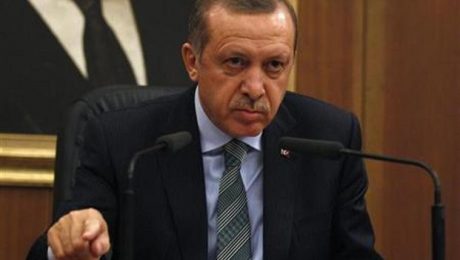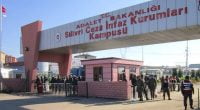Keyword: Persecution of Hizmet by Erdogan

Pakistan submits to Turkey’s ‘authoritarian demands’ on Gulen
Authorities have ordered teachers with alleged links to Turkish cleric Gulen to leave the country as Turkey’s President Erdogan visits Pakistan. Experts say the move is aimed at appeasing Ankara. Pakistani liberal activists say Islamabad should not encourage Erdogan by obliging his government’s unlawful and authoritarian demands. Promotion of secular and democratic values is the only way forward, they say.

From ‘parallel state’ to ‘terrorist organization’: Dissecting Erdoğan’s labeling of Gülen
Yet more than three years since the public feud between Erdoğan and Gülen began, the allegations against the Gülen movement of infiltrating the state, plotting coups, and proselytizing students through its schools still rest on speculation.

Are Turkey’s Prisoners Hostages?
Rumors have circulated throughout Turkey that, under the guise of averting a prison riot, Erdogan might order his forces to fire on the prisons. It is not a scenario beyond the realm of possibility; after all, the late Libyan dictator Muammar Gaddafi did something similar, killing more than 1,000 political prisoners.

Pak-Turk school teachers to be deported as Erdogan visits Pakistan
“PakTurk International Schools and Colleges are deeply concerned over the abrupt decision of the Government requiring the Turkish teachers, management and their family members numbering to approximately 450 individuals including the school-going children, infants and ladies to leave the country within three days – an extraordinary time constraint – in consequence of non-approval of their requests for extension of visa.

Fears for Gulen-inspired Turkish schools in Pakistan grow
Maarif, the foundation that Pak-Turk schools to be transferred to, was set up by Turkish parliament and is an education foundation based on divisive political ideology and racism. It is founded by the Justice and Development Party (AKP) of Turkey to consign AKP’s partisan mentality and political ideology to Islamic and developing countries.

Turkey crackdown: deep unease in Fethullah Gulen’s home village
“They were a family of thinkers,” said a dairy farmer in the village who asked not to be named as he feared repercussions from the authorities. “They were good people. They came from nowhere, they had no water, nothing,” he says, pointing out the Gulen family’s former home, made from clay and rocks.

NGO: plot to take over Turkish schools will fail in Africa
Mrs. Osuji said Hizmet Movement schools, otherwise known as Turkish schools, are contributing to the development of education in Nigeria and other African countries. She urged African governments to resist any plot by the Turkish government to undermine their sovereignties and respectability by accepting its disguised order to hand over the Turkish schools to Maarif Foundation.

AKP deputy: “Imprisoned Gulen supporters and PKK members will be massacred by furious mobs”
Another dirty AKP plan was revealed by AKP deputy Huseyin Kocabiyik. Kocabiyik in his Nov 13th tweet revealed the plan. “Assassinations will be staged against statesmen and furious people will hang all imprisoned PKK members and Hizmet supporters,” he said. “This is what is spoken among the public,” he tweeted.

Relatives Fear Turkish Govt May Kill Prisoners Through Staged Riot
Prisoners jailed in the post-coup crackdown in Istanbul and Ankara these days have far serious problem than torture and ill-treatment: media reports about a mass prison break that could provoke a government intervention, claims about mass executions of the prisoners trying to escape in that attempt.

Crackdown in Turkey passes the point of no return
Turkey’s alliances with the US and EU are fraying badly. Above all, Mr Erdogan is moulding the country in his own image, with only a uniform message allowed. As one liberal intellectual puts it: “In the past you got arrested for what you said, but now you can be arrested for what you don’t say.”

Turkish Gov’t Unveils 16 Ways to Identify Gulenists [as Terrorists]
Turkish authorities have finally come up with a detailed set of measures and criteria to identify suspected Gulenists. After its publication and prime minister’s announcement, critics argued that this presents a perfect textbook of fascism as the government justifies its actions, purges on ludicrous charges devoid of a legal base in universal standards and even country’s current laws.

Another ‘coup suspect’ found dead in Turkish prison, bringing total to 21
At least 21 people have reportedly committed suicide either after they were imprisoned over ties to the movement or after being linked to the movement outside prison. The relatives of most of them claim that the detainees are not the kind of people to commit suicide, shedding doubt on the official narrative. Rumours also have it that some of the detainees were killed after being subjected to torture under custody.

EU report expresses concern about purge against Gülen movement
The progress report on Turkey that was issued on Wednesday by the European Commission expressed concern over the Turkish government’s purge against Gülen movement members, saying “any allegation of wrongdoing needs to be examined with due process, transparent procedures, and the right of every individual to a fair trial or equitable administrative process should be safeguarded.”

Turkey’s Erdogan and onslaughts against opposition
Gulen movement, which is inspired by the highly-respected United States based cleric, Fethullah Gulen, has been brazenly targeted for total destruction by President Erdogan after the failed coup in that country few months ago. The iron-hand President accused members and sympathisers of the movement as being behind the coup.


















